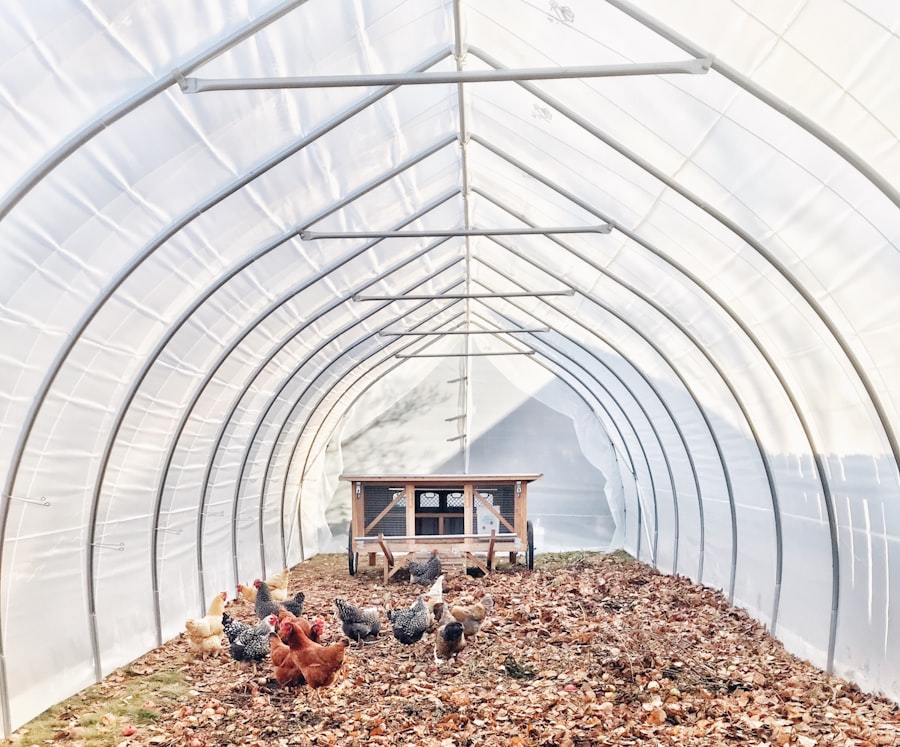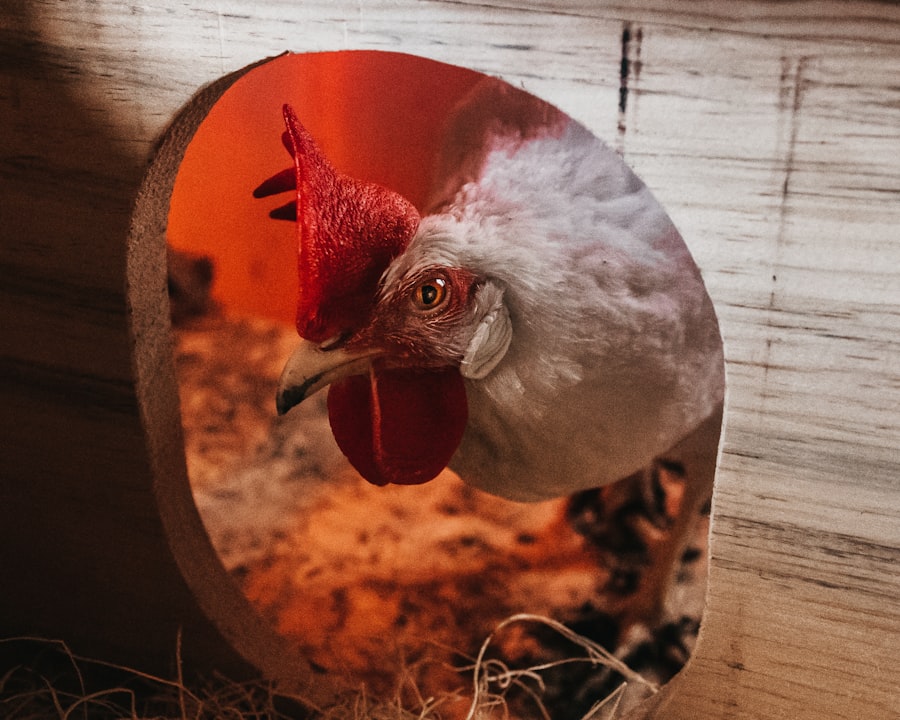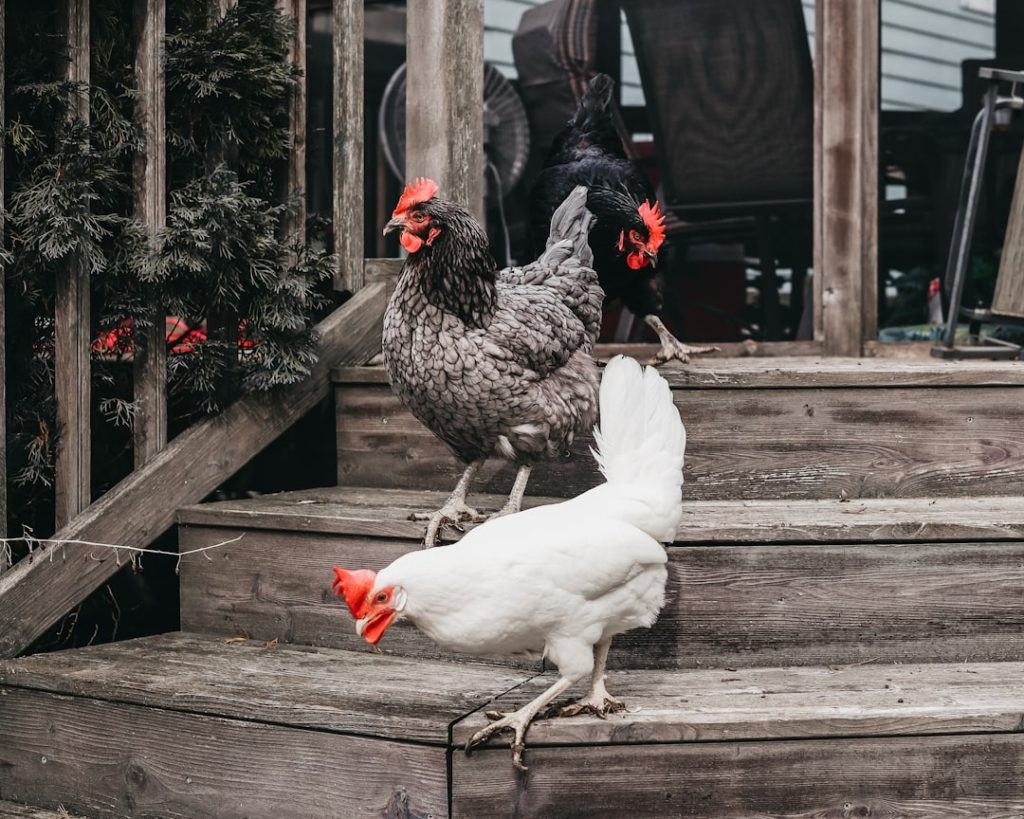Selecting appropriate breeds is essential for successful free-range chicken farming. Certain breeds are more suitable for free-ranging due to their hardiness, adaptability, and natural foraging instincts. Rhode Island Reds, Sussex, and Plymouth Rocks are popular choices for free-range environments, known for their resilience and egg-laying capabilities.
In contrast, smaller or more delicate breeds like Silkies and Polish chickens may be less suited to free-ranging conditions. Climate and environmental factors should also be considered when choosing chicken breeds. Some breeds are better adapted to colder climates, while others thrive in warmer temperatures.
Selecting breeds that are well-suited to the local climate is crucial for ensuring the health and well-being of the flock. When selecting breeds for free-range chickens, it is important to prioritize those with proven success in outdoor environments. Hardiness, adaptability, and foraging instincts are key traits to look for.
Popular free-range breeds such as Rhode Island Reds, Sussex, and Plymouth Rocks are known for these characteristics and their egg-laying abilities. The specific needs and preferences of the farmer should also be taken into account when choosing chicken breeds. Thorough research and careful consideration of all factors will help ensure the selection of the most appropriate breeds for a successful free-range chicken operation.
Table of Contents
Key Takeaways
- Choose breeds that are known for their ability to thrive in free range environments
- Provide adequate shelter and roosting areas to protect chickens from the elements and predators
- Create a secure fenced area to keep chickens safe from predators and prevent them from wandering off
- Ensure free range chickens have access to a balanced diet and clean water at all times
- Implement measures to manage predators and pests that may pose a threat to free range chickens
- Allow chickens to engage in natural foraging and scratching behaviors to promote their physical and mental well-being
- Regularly monitor the health and wellness of free range chickens to address any issues promptly
Providing Proper Shelter and Roosting Areas
Shelter from the Elements
A well-ventilated coop is essential to ensure good air circulation and prevent moisture buildup. This will protect the chickens from the elements and predators, and provide a safe place to rest and lay eggs. The coop should be spacious enough to allow the chickens to move around freely and have separate nesting boxes for laying eggs.
Roosting Areas
Providing roosting bars inside the coop will give the chickens a place to perch at night, which is their natural instinct. This will help them feel secure and comfortable, and allow them to engage in natural behaviors such as scratching and dust bathing.
Outdoor Shelter
In addition to a well-ventilated coop, it’s important to provide outdoor shelter as well. This can include providing shade from the sun and protection from rain and wind. Natural features such as trees or bushes can provide excellent outdoor shelter for free-range chickens. It’s also important to provide enough space for the chickens to roam freely during the day, as this will allow them to engage in natural behaviors.
A Healthy and Happy Flock
Ultimately, providing proper shelter and roosting areas is essential for the health and well-being of free-range chickens. By providing a safe and comfortable environment, you can help ensure a happy and healthy flock.
Creating a Safe and Secure Fenced Area

Creating a safe and secure fenced area is essential when raising free range chickens. This will not only protect them from predators but also prevent them from wandering into areas where they could get into trouble or cause damage. When it comes to fencing, it’s important to choose materials that are sturdy and predator-proof.
This can include using hardware cloth or welded wire fencing with small openings to prevent predators from gaining access. Additionally, burying the fencing underground can help prevent predators from digging underneath and gaining access from below. It’s also important to consider the size of the fenced area when raising free range chickens.
Providing enough space for the chickens to roam freely is essential for their health and well-being. A general rule of thumb is to provide at least 10 square feet per chicken in the fenced area. This will allow them to engage in natural behaviors such as scratching and foraging while also preventing overcrowding and potential aggression among the flock.
Ultimately, creating a safe and secure fenced area is crucial for the safety and well-being of free range chickens. When it comes to raising free range chickens, creating a safe and secure fenced area is essential for their safety and well-being. This will not only protect them from predators but also prevent them from wandering into areas where they could get into trouble or cause damage.
When it comes to fencing, it’s important to choose materials that are sturdy and predator-proof. This can include using hardware cloth or welded wire fencing with small openings to prevent predators from gaining access. Additionally, burying the fencing underground can help prevent predators from digging underneath and gaining access from below.
It’s also important to consider the size of the fenced area when raising free range chickens. Providing enough space for the chickens to roam freely is essential for their health and well-being. A general rule of thumb is to provide at least 10 square feet per chicken in the fenced area.
This will allow them to engage in natural behaviors such as scratching and foraging while also preventing overcrowding and potential aggression among the flock.
Feeding and Watering Free Range Chickens
Feeding and watering free range chickens is an important aspect of their care and management. When it comes to feeding, it’s important to provide a balanced diet that meets their nutritional needs. This can include a combination of commercial feed, grains, fruits, vegetables, and kitchen scraps.
It’s important to provide access to fresh water at all times, as dehydration can quickly become a serious issue for chickens. Additionally, providing access to grit is important for free range chickens, as it helps them digest their food properly. In addition to providing a balanced diet, it’s important to consider how feeding and watering stations are set up in the free range area.
Placing feeders and waterers in multiple locations can help prevent overcrowding and competition among the flock. It’s also important to regularly clean and maintain feeding and watering stations to prevent contamination and disease spread among the flock. Ultimately, providing proper feeding and watering practices is essential for the health and well-being of free range chickens.
Feeding and watering free range chickens is an important aspect of their care and management. When it comes to feeding, it’s important to provide a balanced diet that meets their nutritional needs. This can include a combination of commercial feed, grains, fruits, vegetables, and kitchen scraps.
It’s important to provide access to fresh water at all times, as dehydration can quickly become a serious issue for chickens. Additionally, providing access to grit is important for free range chickens, as it helps them digest their food properly. In addition to providing a balanced diet, it’s important to consider how feeding and watering stations are set up in the free range area.
Placing feeders and waterers in multiple locations can help prevent overcrowding and competition among the flock. It’s also important to regularly clean and maintain feeding and watering stations to prevent contamination and disease spread among the flock.
Managing Predators and Pests
Managing predators and pests is an ongoing challenge when raising free range chickens. Predators such as foxes, raccoons, hawks, and snakes pose a threat to free range chickens and their eggs. It’s important to take proactive measures to protect the flock from these threats by using predator-proof fencing, secure coops at night, and employing deterrents such as motion-activated lights or sound devices.
In addition to predators, pests such as mites, lice, and rodents can also pose a threat to free range chickens. Regularly inspecting the flock for signs of pests and taking proactive measures such as using diatomaceous earth or natural pest control methods can help prevent infestations. Ultimately, managing predators and pests is an ongoing task when raising free range chickens, but taking proactive measures can help protect the flock from potential threats.
Managing predators and pests is an ongoing challenge when raising free range chickens. Predators such as foxes, raccoons, hawks, and snakes pose a threat to free range chickens and their eggs. It’s important to take proactive measures to protect the flock from these threats by using predator-proof fencing, secure coops at night, and employing deterrents such as motion-activated lights or sound devices.
In addition to predators, pests such as mites, lice, and rodents can also pose a threat to free range chickens. Regularly inspecting the flock for signs of pests and taking proactive measures such as using diatomaceous earth or natural pest control methods can help prevent infestations.
Allowing for Natural Foraging and Scratching

Natural Foraging Behavior
Foraging allows chickens to search for insects, seeds, plants, and other natural food sources that contribute to a balanced diet. It also provides mental stimulation and exercise as they explore their environment.
The Importance of Scratching
Scratching is another natural behavior that allows chickens to dig through soil or litter in search of food or create dust baths for grooming purposes. This behavior is essential for their physical and mental well-being.
Providing Ample Space Outdoors
Allowing free range chickens ample space outdoors where they can engage in these natural behaviors is essential for their overall health and happiness. By providing a suitable environment, chickens can thrive and live a happy and healthy life.
Monitoring Health and Wellness of Free Range Chickens
Monitoring the health and wellness of free range chickens is an ongoing responsibility when raising them. Regularly observing the flock for signs of illness or injury is crucial in identifying potential issues early on. In addition to visual observation, monitoring egg production, weight fluctuations, behavior changes, and overall flock dynamics can provide valuable insight into the health of the flock.
Regularly scheduled veterinary check-ups can also help ensure that any potential health issues are addressed promptly. Ultimately, monitoring the health and wellness of free range chickens is essential in providing them with proper care. Monitoring the health of free range chickens involves regularly observing the flock for signs of illness or injury early on.
In addition visual observation monitoring egg production weight fluctuations behavior changes overall flock dynamics can provide valuable insight into the health of the flock. Regularly scheduled veterinary check-ups can also help ensure that any potential health issues are addressed promptly.
If you’re looking for ideas on how to keep free range chickens in your yard, you might also be interested in this article on chicken coop interior ideas. It offers tips and inspiration for creating a comfortable and functional living space for your chickens.
FAQs
What are free range chickens?
Free range chickens are poultry that are allowed to roam freely in a yard or open area, rather than being confined to a coop or small space.
How do you keep free range chickens in your yard?
To keep free range chickens in your yard, you should provide a secure and predator-proof coop for them to roost in at night, as well as a fenced-in area for them to roam during the day. It’s important to regularly check the fencing for any holes or weak spots that could allow predators to enter.
What should you feed free range chickens?
Free range chickens can forage for insects, plants, and seeds in the yard, but it’s also important to provide them with a balanced diet of chicken feed to ensure they are getting all the necessary nutrients.
How much space do free range chickens need?
Free range chickens should have at least 10 square feet of outdoor space per bird to roam and forage. It’s important to provide enough space to prevent overcrowding and reduce the risk of aggression and disease.
What are the benefits of keeping free range chickens?
Keeping free range chickens can provide a sustainable source of fresh eggs, natural pest control in the yard, and the opportunity to observe and interact with these fascinating birds. Additionally, free range chickens can contribute to a more sustainable and environmentally friendly lifestyle.
Meet Walter, the feathered-friend fanatic of Florida! Nestled in the sunshine state, Walter struts through life with his feathered companions, clucking his way to happiness. With a coop that’s fancier than a five-star hotel, he’s the Don Juan of the chicken world. When he’s not teaching his hens to do the cha-cha, you’ll find him in a heated debate with his prized rooster, Sir Clucks-a-Lot. Walter’s poultry passion is no yolk; he’s the sunny-side-up guy you never knew you needed in your flock of friends!







